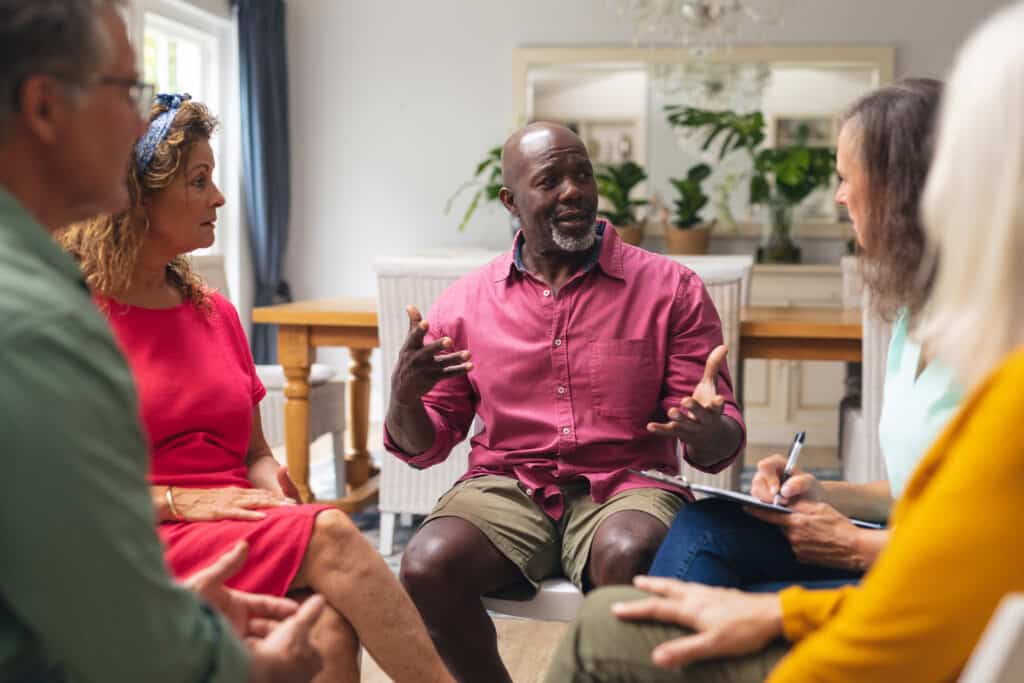
In the ever-evolving field of mental health treatment, group therapy has emerged as a powerful and effective method for individuals seeking to improve their emotional well-being. While one-on-one therapy sessions are often the first choice for those facing mental health challenges, group therapy offers unique benefits that are becoming increasingly recognized. This form of therapy not only provides a supportive environment where individuals can share their experiences with others who face similar struggles, but it also fosters a sense of community and belonging that is often missing in individual therapy. By participating in group sessions, individuals gain valuable insights from others, learn new coping strategies, and develop interpersonal skills that are essential for building healthier relationships. This article delves into the advantages of group therapy, how it works, and why it might be the right choice for you.
What is Group Therapy?

Group therapy is a form of psychotherapy that involves one or more therapists working with several individuals at the same time. This method is designed to provide participants with a supportive environment where they can share their experiences, learn from others, and develop new coping strategies. The group setting fosters a sense of community and belonging, which can be incredibly healing for individuals who may feel isolated in their struggles.
The Benefits of Group Therapy
Group therapy offers a range of benefits that can complement individual therapy or serve as a standalone treatment. Here are some of the key advantages:
1. Shared Experiences and Mutual Support
One of the most significant benefits of group therapy is the opportunity to connect with others who are facing similar challenges. This shared experience can be incredibly validating and can help reduce feelings of isolation and loneliness. Participants often find comfort in knowing that they are not alone in their struggles, and this sense of community can be a powerful motivator for change.
2. Diverse Perspectives and Feedback
In a group therapy setting, participants have the chance to hear different perspectives and receive feedback from multiple sources. This diversity of viewpoints can provide valuable insights and help individuals see their issues from new angles. Additionally, the feedback from group members can be more relatable and impactful than that from a therapist alone, as it comes from people who are experiencing similar challenges.
3. Improved Social Skills
Group therapy provides a safe and supportive environment for individuals to practice and develop their social skills. Participants can work on communication, assertiveness, and conflict resolution in real-time with others who are also focused on personal growth. Over time, these skills can translate into improved relationships and greater confidence in social situations outside of the therapy group.
4. Increased Accountability
The group setting naturally creates a sense of accountability, as participants are encouraged to share their progress and setbacks with the group. Knowing that others are invested in their success can motivate individuals to stay committed to their therapeutic goals. Additionally, seeing the progress of others can inspire participants to continue working towards their own goals.
5. Cost-Effective Treatment Option
Compared to individual therapy, group therapy is often a more cost-effective option. This makes it accessible to a broader range of people who may not be able to afford one-on-one sessions. Despite the lower cost, group therapy can be just as effective as individual therapy, particularly for certain issues like anxiety, depression, and relationship problems.
Types of Group Therapy

There are several types of group therapy, each designed to address specific issues or populations. Some of the most common types include:
1. Support Groups
Support groups are designed to provide emotional support and practical advice for individuals facing specific challenges, such as grief, addiction, or chronic illness. These groups are often led by a trained therapist but may also be facilitated by a peer who has experienced similar challenges.
2. Cognitive-Behavioral Therapy (CBT) Groups
CBT groups focus on helping participants identify and change negative thought patterns and behaviors. This type of group therapy is often used to treat anxiety, depression, and other mood disorders. Participants learn coping strategies and cognitive techniques that they can apply in their daily lives.
3. Interpersonal Therapy (IPT) Groups
Interpersonal groups focus on improving relationships and communication skills. These groups are particularly helpful for individuals struggling with relationship issues, social anxiety, or difficulty in forming and maintaining relationships. The group setting allows participants to practice new interpersonal skills in a supportive environment.
4. Psychoeducational Groups
Psychoeducational groups are designed to provide information and education on specific mental health issues, such as bipolar disorder, PTSD, or eating disorders. These groups often include a mix of education, skill-building, and group discussion. Participants gain a better understanding of their condition and learn practical strategies for managing symptoms.
5. Process-Oriented Groups
Process-oriented groups focus on the dynamics and interactions within the group itself. These groups are less structured and allow participants to explore their thoughts, feelings, and behaviors in relation to others in the group. This type of therapy is often used to help individuals gain insight into their interpersonal patterns and improve their relationships.
Who Can Benefit from Group Therapy?

Group therapy can be beneficial for a wide range of individuals, regardless of their specific mental health challenges. Some people may find group therapy particularly helpful if they:
- Feel Isolated: Provides a sense of connection and community, which can be especially valuable for individuals who feel isolated or lonely.
- Struggle with Relationships: For those who have difficulty forming or maintaining relationships, group therapy offers a space to practice and develop interpersonal skills.
- Need Peer Support: Allows participants to receive support and feedback from others who are facing similar challenges, which can be more impactful than feedback from a therapist alone.
- Are Looking for Cost-Effective Treatment: Is often more affordable than individual therapy, making it a viable option for those who may not have the financial resources for one-on-one sessions.
How to Get the Most Out of Group Therapy
To fully benefit from group therapy, participants should approach the experience with an open mind and a willingness to engage with the group. Here are some tips for making the most of group therapy:
1. Be Open and Honest
Group therapy is most effective when participants are willing to be open and honest about their thoughts, feelings, and experiences. Sharing openly with the group can lead to deeper insights and more meaningful connections with others.
2. Listen Actively
Active listening is a crucial component of group therapy. By fully focusing on what others are saying, participants can gain new perspectives and learn from the experiences of their peers.
3. Give and Receive Feedback
Giving and receiving feedback is an important part of the group therapy process. Constructive feedback can help participants gain insight into their behaviors and thought patterns, while receiving feedback from others can provide valuable guidance for personal growth.
4. Commit to the Process
Group therapy is a process that takes time, and participants should be committed to attending sessions regularly and actively participating. Consistency is key to building trust within the group and making meaningful progress.
5. Respect Confidentiality
Confidentiality is a cornerstone of group therapy. Participants should respect the privacy of others in the group by keeping what is shared during sessions confidential. This creates a safe and trusting environment where everyone can feel comfortable sharing openly.
Overcoming Common Misconceptions About Group Therapy

Despite its many benefits, some people may feel hesitant to try group therapy due to common misconceptions. Here are a few myths about group therapy and the truth behind them:
1. “I Won’t Get Enough Individual Attention”
While it’s true that group therapy involves sharing time with others, participants often find that the feedback and support from the group as a whole are just as valuable as one-on-one attention from a therapist. Additionally, many group therapy sessions include opportunities for individual check-ins and personalized feedback.
2. “I’ll Be Judged by Others”
Group therapy is designed to be a non-judgmental and supportive environment. Participants are encouraged to share openly, and group members are typically very accepting and understanding of each other’s experiences.
3. “Group Therapy Isn’t as Effective as Individual Therapy”
Research has shown that group therapy can be just as effective as individual therapy for many issues, particularly when it comes to building social skills, improving relationships, and gaining support from peers. In some cases, the group dynamic can even enhance the therapeutic process by providing diverse perspectives and shared experiences.
4. “I’m Too Shy for Group Therapy”
It’s natural to feel nervous about sharing in a group setting, especially if you’re shy or introverted. However, many people find that group therapy helps them gradually build confidence in expressing themselves. The supportive environment of the group can make it easier to open up over time.
Embracing the Power of Group Therapy
Group therapy offers a unique and powerful opportunity for personal growth, healing, and connection. Whether you’re struggling with anxiety, depression, relationship issues, or simply looking to improve your overall well-being, group therapy can provide the support and guidance you need to thrive. By sharing your journey with others who understand your challenges, you can gain new insights, develop valuable skills, and build meaningful relationships that can last a lifetime.
At Beyond Healing, we offer a variety of group therapy options to meet your unique needs. Our experienced therapists are dedicated to creating a safe and supportive environment where you can explore your thoughts and feelings, learn from others, and work towards your goals. Contact us today to learn more about our group therapy programs and take the first step towards a healthier, happier life.
Table of Contents
Introduction to Group Therapy
- What is Group Therapy?
- The Growing Popularity of Group Therapy in Mental Health
The Unique Benefits of Group Therapy
- Building a Supportive Community
- Gaining New Perspectives and Insights
- Learning and Practicing Social Skills
- Accountability and Motivation
- Reducing Feelings of Isolation
How Group Therapy Works
- Types of Group Therapy (e.g., Cognitive Behavioral, Support Groups, Psychoeducational)
- The Role of the Therapist in Group Settings
- Structure of a Typical Group Therapy Session
Who Can Benefit from Group Therapy?
- Conditions and Situations Best Suited for Group Therapy
- How to Know if Group Therapy is Right for You
Challenges and Considerations
- Potential Challenges in Group Dynamics
- Addressing Concerns About Privacy and Confidentiality
- Overcoming Initial Anxiety in Joining a Group
Success Stories: Real-Life Impact of Group Therapy
- Case Studies and Testimonials
- How Group Therapy Transformed Lives
How to Get Started with Group Therapy
- Finding a Group Therapy Session Near You
- What to Expect in Your First Session
- Tips for Maximizing the Benefits of Group Therapy
Conclusion
- Summarizing the Power of Group Therapy
- Encouragement to Explore Group Therapy as a Healing Tool


